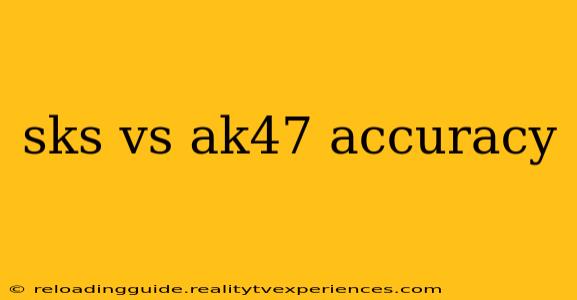The age-old debate: SKS vs. AK-47. Both are iconic rifles with a rich history, but which one reigns supreme in terms of accuracy? The answer isn't a simple "one is better than the other." Accuracy depends on a multitude of factors, including ammunition, barrel condition, shooter skill, and even environmental conditions. However, we can delve into a detailed comparison to understand the inherent accuracy potential of each rifle.
Understanding Accuracy Metrics
Before comparing the SKS and AK-47, let's clarify what we mean by "accuracy." We're looking at the rifle's inherent ability to group shots at a given distance. This involves several key elements:
- Minute of Angle (MOA): A common metric representing the diameter of a circle (in inches) at 100 yards. A smaller MOA indicates higher accuracy.
- Zeroing: The process of adjusting the sights to ensure the bullet impacts the target at the desired point.
- Consistency: The ability of the rifle to produce consistently-sized groups of shots.
SKS: A Closer Look
The SKS, a self-loading carbine, boasts a relatively long barrel for its size. This contributes to better inherent accuracy compared to some other similar designs. However, its design choices also present limitations.
SKS Accuracy Factors:
- Barrel Length: The longer barrel generally improves velocity and accuracy, but this advantage is somewhat negated by other factors.
- Sights: The iron sights on the SKS are relatively basic and can contribute to inconsistencies, especially at longer ranges. Upgrades are possible, but this adds cost and complexity.
- Ammunition: The SKS is known for its sensitivity to ammunition quality. High-quality ammunition is crucial for achieving the best possible accuracy.
- Manufacturing Variations: SKS rifles were produced in various countries and over different time periods, leading to variations in manufacturing quality and, consequently, accuracy.
AK-47: A Legendary Platform
The AK-47, renowned for its reliability and ruggedness, is often perceived as less accurate than the SKS. While this is a generalization, it's partially based on its design philosophy prioritizing reliability over pinpoint accuracy.
AK-47 Accuracy Factors:
- Barrel Length: While AK-47 variations exist with differing barrel lengths, generally shorter barrels result in less accuracy compared to longer barrels found in some SKS models.
- Sights: Similar to the SKS, the AK-47's iron sights are a contributing factor to accuracy limitations, especially at distance.
- Ammunition: The AK-47 is generally considered more tolerant of lower-quality ammunition compared to the SKS, but high-quality ammunition will still yield better results.
- Gas System: The gas-operated system of the AK-47, while robust, can influence accuracy, particularly with its inherent recoil impulse.
Head-to-Head Comparison:
Directly comparing MOA values is difficult due to the numerous variables mentioned above. However, a general assessment suggests the SKS potentially offers slightly better inherent accuracy than the AK-47 under ideal conditions. This is largely attributed to its longer barrel and simpler action. However, the difference is likely marginal for most shooters at typical engagement distances.
Conclusion: It's More Than Just the Rifle
Ultimately, the accuracy of both the SKS and AK-47 is greatly influenced by external factors. A skilled shooter with high-quality ammunition will achieve far better results with either rifle than an unskilled shooter using inferior ammunition. The choice between the two should be based on individual needs and preferences, considering factors beyond just raw accuracy, such as reliability, maintenance, cost, and availability. Both are capable firearms with their own strengths and weaknesses.

